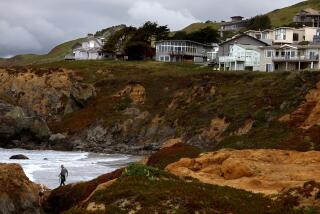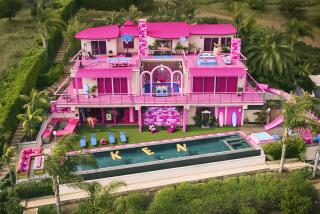Handling a Houseboat Can Be Easy Even Without Experience : Transportation: A vessel sleeping 10 costs about $1,500 a week in the summer, not including gas, and must be docked slowly .
- Share via
Vacationing by houseboat seems to be increasing in popularity, but some consumers have misconceptions about this kind of travel experience.
One of the major concerns many travelers have is that they ought to be experienced in handling a houseboat, which isn’t necessarily so, according to houseboat company operators.
“People think running a houseboat is harder than it actually is,” said Karen Lippe of Seven Crown Resorts, which bills itself as the largest houseboating and marina resort company in the United States. Based in Irvine, Seven Crown has more than 300 houseboats for rent on the California Delta, a 1,000-mile network of rivers, tributaries and channels in Northern California near Sacramento; Shasta Lake; Lake Mead, Nev., and Lake Mohave, Nev. In 1992, Seven Crown had about 6,000 bookings, up 12% from 1991.
“The most difficult part of handling a houseboat is pulling out from the dock and parking it,” Lippe added. “The boats don’t have any brakes, so you have to handle it slowly. But the boats only travel at a maximum of 12 miles an hour, so you’re not moving very fast at any time.”
Seven Crown’s orientation sessions include a walk-through of the boat, with demonstrations provided by company representatives. However, trial runs generally aren’t offered.
“We don’t get many accident reports about houseboats, and as long as one is careful, they’re wonderful vacations,” said Ben Benites, a manager for California’s Department of Boating and Waterways, based in Sacramento.
“Most of the accidents involve property damage when people ram into other boats while mooring,” Benites said. “Sometimes they don’t pay enough attention to wind and currents, and don’t fully realize that houseboats lack the power and maneuverability of other boats.”
Diving into shallow water can be another hazard, said Benites. “People should never dive off the top of a houseboat without confirming the depth of the water. We’ve had several neck injury reports. For example, someone jumps into four feet of water, which is deep enough for the houseboat to move in but not safe to dive into. It’s like diving into the shallow end of a pool.”
According to Benites, there were 17 houseboating accidents reported in California in 1991, the last year that figures on the subject are available.
“More consumers have become aware of houseboats as an alternative form of travel,” said Darla Cook, director of sales and marketing for Forever Resorts. The Phoenix-based company operates 90 houseboats in Nevada, Texas, Missouri, Florida and Kentucky. “We get lots of novices, but we send them an instructional video, then provide a run-through instruction at the marina. A lot of people don’t realize how easy it is until they operate the boat.”
In 1992, Forever Resorts added Lake of the Ozarks in Missouri and St. John’s River in Central Florida to its roster of houseboat locations. The company plans to add Lake Cumberland in Kentucky this year.
“About 40%-50% of our renters, who range in age from the 20s to the 70s, are novices,” said Bill Schappel, owner of King Island Houseboat Rentals, based at Lakehead, Calif., at Shasta Lake. The company offers 22 houseboats ranging in length from 40 to 56 feet in the Delta and on Shasta Lake. “Initially, some people feel uncomfortable and think the boat is too big for them to handle. But once they get out there on the water, they find it isn’t hard to manage the boat.”
Houseboats come in different sizes. Some are considerably more luxurious than others. For example, Seven Crown’s houseboats sleep from six to 10 people and range in size from 43 to 49 feet. All come with fully equipped kitchens, refrigerators/freezers, pots and pans, utensils, dishes and glasses, and silverware. They have pillows with disposable cases on built-in bunks, plus soap, stacking chairs, large and small trash cans and extra bags. Bathrooms have a shower or tub. Guests must bring their own sheets, blankets and towels.
On less expensive houseboats, lights are run by battery, with propane used for stoves, the water heater and the refrigerator.
On the more expensive houseboats, generators are used for all of the electrical power, including air conditioning. Microwave ovens may also be included. All of the houseboats on Lake Mohave and Lake Mead have generators and air conditioning. They are offered on some Shasta Lake boats, but not on the California Delta houseboats.
Forever Resorts has mostly 54-foot-long houseboats sleeping 10 passengers. These air-conditioned houseboats offer a fully equipped kitchen, five queen-size beds and a bath and a half. Entertainment equipment includes television, VCR and stereo cassette. Pillows, blankets, towels and sheets are all included.
Smaller boats offered by King Island have fewer amenities, most notably they lack generators to provide air conditioning. But all of the boats have full kitchens and bunk-type beds that sleep six to 10 people.
Houseboats more than 16 feet long are required to carry a throwable personal flotation device such as a life ring, plus a life jacket of the appropriate size for each person aboard.
Prices vary according to season as well as type of houseboat. Generally, the rental period is for a minimum of three days.
On the California Delta, Seven Crown’s prices for a houseboat sleeping 10 during the off-season, which this year began in September and continues through June 14, are $450 for a three-day rental, $750 for seven days. During the summer season, June 15 through Sept. 15, prices rise to $650 and $1,150. A three-day rental on either Lake Mead or Lake Mohave for a houseboat sleeping six during the off-season is $650; for seven days, $1,050, and during the summer, $950 and $1,450.
Forever Resorts’ 1993 rates, during the off-season, are $1,095 for three-night rentals and $1,550 for seven nights. In the summer, rates go up to $1,275 for three nights, $1,795 for seven nights.
King Island’s prices in 1993, during the off-season period that extends to the the last week in March, run $295-$505 for three days, and $495-$756 for seven days. Until near mid-June, three-day rentals go from $455-$775, and seven days $595-$1,260. During the peak summer season, mid-June through Labor Day, three-day rates range $595-$1,045, and seven days $995-$1,764. Rates go back down, starting at $455-$595 until the end of October.
Houseboat rental prices are based on the boat itself, not the number of renters involved. However, there can be a surcharge if you bring aboard more people than the boat is outfitted for. Typically, deposits are $300-$500.
Prices don’t include gas, so renters should budget for this expenditure. “Figure $30 to $50 a day for gas as the average,” Lippe said. “Our boats get about seven miles a gallon.”
People often miscalculate how much food to bring.
“Renters should stock up on non-perishable food items,” Lippe advised. “While there are convenience stores at some marinas, these places don’t have the same range of merchandise, and the prices are likely to be higher. But don’t bring a week’s worth of perishable foods; bring pre-prepared foods and freeze them.”
Children of all ages can be brought aboard the houseboats. Life jackets are provided for guests, but they may be adult size. Thus, travelers should ask in advance if they plan to bring very young children along.
For more information on houseboating, contact your travel agent or Forever Resorts at (800) 255-5561, King Island Houseboat Rentals at (916) 238-2303, and Seven Crown Resorts at (800) 752-9669.
More to Read
Sign up for The Wild
We’ll help you find the best places to hike, bike and run, as well as the perfect silent spots for meditation and yoga.
You may occasionally receive promotional content from the Los Angeles Times.






